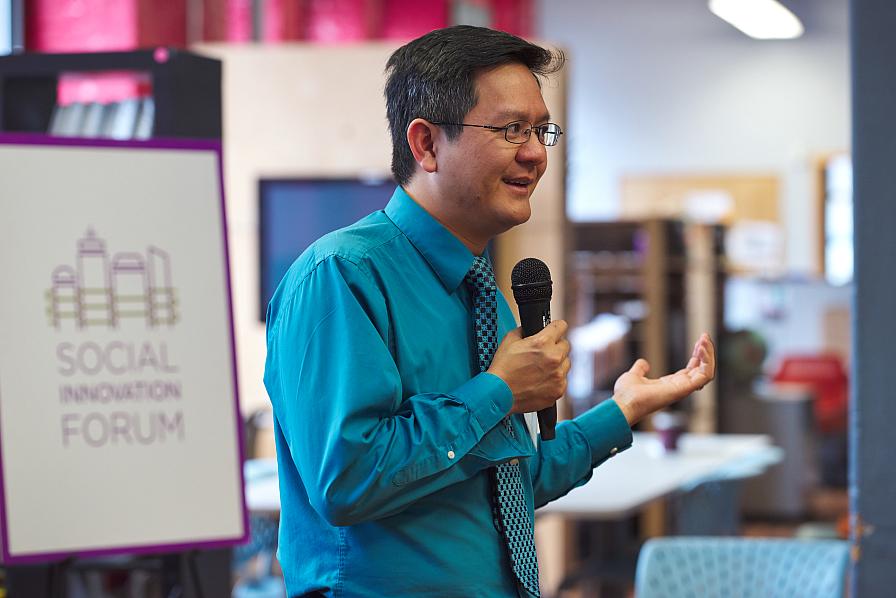
On a wet Tuesday morning, a crowd of over 100 funders and nonprofit leaders gathered at the More Than Words South End bookstore, a 2009 Social Innovator and nonprofit social enterprise that empowers young people by teaching them life and business skills. The crowd began by mingling on the second floor warehouse which had been transformed into an event space, enjoying breakfast provided by Haley House, a 2003 Social Innovator, while they waited for the reason they had trekked through the rain: a discussion with Nonprofit AF blogger and nonprofit leader Vu Le on building better funder and nonprofit partnerships.
After an introduction by a More Than Words youth Jaquan, who spoke about how More Than Words has inspired him to become a teacher, Social Innovation Forum (SIF) Associate Director of Community Engagement & New Initiatives Anna Trieschmann began with a theme that would carry through the morning: trust. Anna pointed out that everyone in the room had trusted SIF by going along with the innovative plus-one system SIF had used for registration, in which nonprofit leaders and funders were encouraged to invite a funder/nonprofit counterpart as their “partner” for the event in order to attend and discuss the talk together. This achieved and near-perfect balance of nonprofits and funder representation in the room.
Nonprofit leaders must be honest about challenges and success so that funders can be true partners through ups and downs.
Following Anna, Vu Le spoke, highlighting several places where we can all make strides to improve nonprofit-funder relationships. Some of these areas included:
- We must trust one another and lead with honesty. Nonprofits are sometimes afraid to be honest to funders about what’s going well, or not well, and feel pressure to always present their work in a positive light. Nonprofit leaders must be honest about challenges and success so that funders can be true partners through ups and downs. Funders are often only committing one-year grants to nonprofits and could demonstrate more trust in the leadership and organization with longer term funding that gives organizations flexibility and time to focus on their important work.
- Funding should move without being dependent on metrics. Our measurement efforts, though designed to prove effectiveness, often don’t capture the whole picture or what’s relevant to the community served. But, without these metrics, funders can be hesitant to give money. Organizations should be encouraged to measure what is most beneficial to their organization and community and funders must realize that it requires significant resources to conduct performance measurement and that there is much more to an organization than its data.
- We need to commit to multiyear general operating support. Giving money for one year and expecting instant results is unrealistic. Funders need to commit to working with nonprofits for long-term growth, understanding that the complexity of the problems that nonprofits are working to address requires patience and partnership.
- Let’s spend less time on applications and more time doing our critical work. Nonprofit staff spend enormous amounts of time fitting their organization’s mission, vision, programming, and data into different application formats and this takes time away from doing the important programmatic work that the community needs. Funders should consider streamlining applications, accepting applications to other funders, or spending more time talking with nonprofit leaders to get the information they need.
- We need to be more intentional about funding organizations led by people of color. Organizations led by people of color and other historically excluded groups (people with disabilities, LGBTQ+ people, and others) receive a tiny proportion of grant money and are often at a disadvantage for applying to larger grants. Funders should consider expanding their portfolio to fund more organizations led by leaders of color and other community-based leaders.
Vu was then joined at the front of the room by Anita Sharma, Executive Director of the Political Asylum/Immigration Representation (PAIR) Project (a 2018 Social Innovator) and Megan Reilly, New England Program Officer of the Clowes Fund, to explore what a healthy nonprofit and funder relationship looks like. Anita described her deep appreciation for Megan’s enthusiasm for learning, and her genuine care for how the work and the staff are doing. Megan spoke to the importance of connecting on a human level. For example, not being too afraid as a funder to raise expectations by going out for coffee, but rather being open and honest about funding prospects and always making time to connect with and learn from nonprofit leaders.
Vu asked Anita and Megan for parting advice for those of us in the room. Anita encouraged us not to be afraid to have frank conversations-- to go out for coffee and put in the time with each other, at least once or twice a year. Megan urged us to learn from one another, ask and want to know how things are really going-- not just what’s going well, but challenges, too.
This conversation is not an action. Don’t feel proud of yourselves for being here.
Vu closed with a call to action, delivered with his trademark honesty that both challenged us and made us laugh: “This conversation is not an action. Don’t feel proud of yourselves for being here. If you want to measure something, measure how much funding you’re moving. Measure how much of your funding is going to multiyear general operating support. Measure how much you’re funding organizations led by people of color.” In summary? “Let’s stop the B.S. cycle and let’s do stuff.”
Following the discussion, the room buzzed. Some people stood and chatted with each other. Many approached Vu, Megan, and Anita. Some people went downstairs to browse and shop from the 40,000 books in the More Than Words store. One funder and nonprofit leader who came together left to go find a cafe, having agreed that the best time-- for coffee, for honest conversation, for action-- is now.
 Social Innovation Forum
Social Innovation Forum